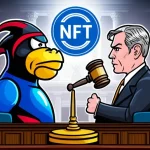Hashling NFT Founder Sued for Alleged $3M Fraud and Misuse of Investor Funds

Hashling NFT Founder Faces Allegations of Misappropriating Millions from Investors
Jonathan Mills, the founder of the Hashling NFT project and CEO of Satoshi Labs LLC, is embroiled in a lawsuit over accusations of fraud and misappropriation of investor funds. This case underscores the legal challenges confronting crypto startups, particularly those involved with NFTs and decentralized financing.
- Lawsuit filed against Jonathan Mills in Illinois
- Allegations of fraud and misuse of investor funds
- Case highlights legal challenges faced by crypto startups
- Industry responds with NFT legal defense fund
On May 14, a civil lawsuit was filed against Jonathan Mills in Illinois by investors, including Dustin Steerman, who initially brought the NFT project to Mills’ attention. The plaintiffs accuse Mills of fraud, breach of fiduciary duty (which means failing to act in the best interest of the investors he was supposed to represent), and unjust enrichment (unfairly benefiting at the expense of others). According to court documents, Mills allegedly diverted at least $3 million from a Bitcoin mining operation to Satoshi Labs LLC, a company he controlled. He also promised equity returns from $1.46 million invested through two NFT drops on the Solana and Bitcoin blockchains, but investors received nothing. NFT drops refer to the release of new NFTs for sale on a platform, while Solana and Bitcoin are blockchain networks where these NFTs were launched.
Mills allegedly secured 67% of the company’s equity and voting rights, leaving other investors with a mere 2% despite their significant contributions. The lawsuit portrays the shareholder agreement as “rife with errors,” giving Mills de facto control over all business decisions. This control over the company’s finances and structure allowed Mills to allegedly prioritize his personal gain, leaving investors high and dry.
Jonathan Mills’ situation is a stark reminder of the pitfalls investors can face in the crypto world. The industry is no stranger to legal battles, with cases like the Evolved Apes NFT rug pull (where the project creators disappear with investors’ funds) and the SEC’s lawsuit against Touzi Capital for similar fraudulent activities. These incidents highlight the vulnerabilities investors face when dealing with crypto startups that often operate with informal governance structures, leaving little room for legal recourse when things go south.
As the case against Mills unfolds, the broader regulatory landscape is shifting. The introduction of the New Frontiers in Technology Act (NFT Act) by Congressman William Timmons in September 2024 could significantly impact the NFT industry. This legislation aims to clarify the legal and regulatory treatment of NFTs, potentially defining certain NFTs as non-securities and offering protections for them. Additionally, the incoming Trump administration, with pro-crypto appointments like David Sacks, former PayPal COO, could signal a change in regulatory approaches towards cryptocurrencies and NFTs.
The industry isn’t sitting still amidst these legal challenges. OpenSea has established an NFT legal defense fund, raising $6 million to support creators and developers facing similar legal issues. This proactive stance reflects the industry’s commitment to navigating the complex legal waters of the crypto world, even as Mills allegedly thought he could mine Bitcoin and mint NFTs, but all he managed to dig up was a lawsuit.
As we watch the Mills case unfold, it’s clear that the crypto space needs clearer legal frameworks and better investor protections. Whether through new legislation or industry initiatives, addressing these vulnerabilities is crucial to fostering a more secure and transparent environment for all involved.
Key Takeaways and Questions
-
What are the allegations against Jonathan Mills?
Jonathan Mills is accused of fraud, breach of fiduciary duty, and unjust enrichment for allegedly diverting millions from a joint NFT and Bitcoin mining venture for personal gain.
-
How did Mills allegedly control the company’s finances and structure?
Mills allegedly controlled the company’s finances and structure by drafting a shareholder agreement that allocated him 67% of the equity and voting control, leaving other investors with minimal equity despite their contributions.
-
What broader issues does the Hashling NFT case highlight?
The case highlights the growing legal scrutiny of crypto startups, particularly those involving NFTs and decentralized financing, due to their often informal governance structures and the resulting vulnerability of investors.
-
What other notable cases are mentioned?
The Evolved Apes NFT rug pull and the SEC’s lawsuit against Touzi Capital are other examples of investor vulnerability in the crypto space.
-
What legal actions are the plaintiffs seeking in the lawsuit against Mills?
The plaintiffs are seeking restitution and the establishment of a constructive trust over the disputed assets to prevent further funds diversion.
-
What recent regulatory developments could impact the NFT industry?
The New Frontiers in Technology Act aims to clarify the legal treatment of NFTs, potentially defining certain NFTs as non-securities and providing protections for them. The incoming Trump administration’s pro-crypto stance could also lead to regulatory shifts.
-
How is the industry responding to legal challenges?
The industry has established an NFT legal defense fund, raising $6 million to support creators and developers facing regulatory actions, reflecting a proactive stance against legal challenges.


